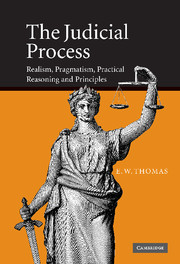Book contents
- Frontmatter
- Contents
- Preface
- 1 Introduction
- 2 Muddling along
- 3 The ‘curse’ of formalism
- 4 Legal fundamentalism
- 5 The idolatry of certainty
- 6 The piety of precedent
- 7 The foibles of precedent – a case study
- 8 There is no impersonal law
- 9 So, what is the law?
- 10 The constraints on the judiciary
- 11 Towards a new judicial methodology
- 12 Of realism and pragmatism
- 13 Of … practical reasoning and principles
- 14 Taking law seriously
- 15 A theory of ameliorative justice
- Subject index
- Authors index
11 - Towards a new judicial methodology
Published online by Cambridge University Press: 15 July 2009
- Frontmatter
- Contents
- Preface
- 1 Introduction
- 2 Muddling along
- 3 The ‘curse’ of formalism
- 4 Legal fundamentalism
- 5 The idolatry of certainty
- 6 The piety of precedent
- 7 The foibles of precedent – a case study
- 8 There is no impersonal law
- 9 So, what is the law?
- 10 The constraints on the judiciary
- 11 Towards a new judicial methodology
- 12 Of realism and pragmatism
- 13 Of … practical reasoning and principles
- 14 Taking law seriously
- 15 A theory of ameliorative justice
- Subject index
- Authors index
Summary
A methodology for the twenty-first century
No judge, lawyer or academic is going to agree with all the points made in the preceding chapters. Legal theory and discourse is too diverse and the dispositions of judges, lawyers and academics too divergent to achieve any such unanimity. But it is hoped that some judges will attain sufficient benefit to advance their perception of the judicial role. What should emerge is a refreshingly new judicial methodology that will better serve the interests of society. The various strands pursued in this book can be brought together to form a synthesis of realism, pragmatism and practical reasoning, including in that reasoning a critical role for principles.
Judicial reasoning will be re-invigorated by being less entrammelled by unnecessary and outdated dogmas. It will be at once more realistic and pragmatic, it will be forward looking rather than oriented to the past, it will be more honest and transparent, and it will be more diligent and creative in meeting the particular needs of society. The legal process will be no less, and even more, disciplined than at present, and no less, and again even more, beholden to a realistic and modern conception of the rule of law.
Basic to this fresh approach is the reiterated truism that the law is a social institution that exists to serve society. This subjection to the needs and expectations of society is its ultimate rationale and justification.
- Type
- Chapter
- Information
- The Judicial ProcessRealism, Pragmatism, Practical Reasoning and Principles, pp. 270 - 301Publisher: Cambridge University PressPrint publication year: 2005

